Owning a saltwater pool is a great way to enjoy swimming with fewer of the harsh effects of traditional chlorine. However, saltwater pools do require consistent care to keep them functioning efficiently and safely. Our comprehensive guide will walk you through the essentials of salt water pool maintenance, including proper water chemistry, regular cleaning tasks, and how to get the most out of your pool.
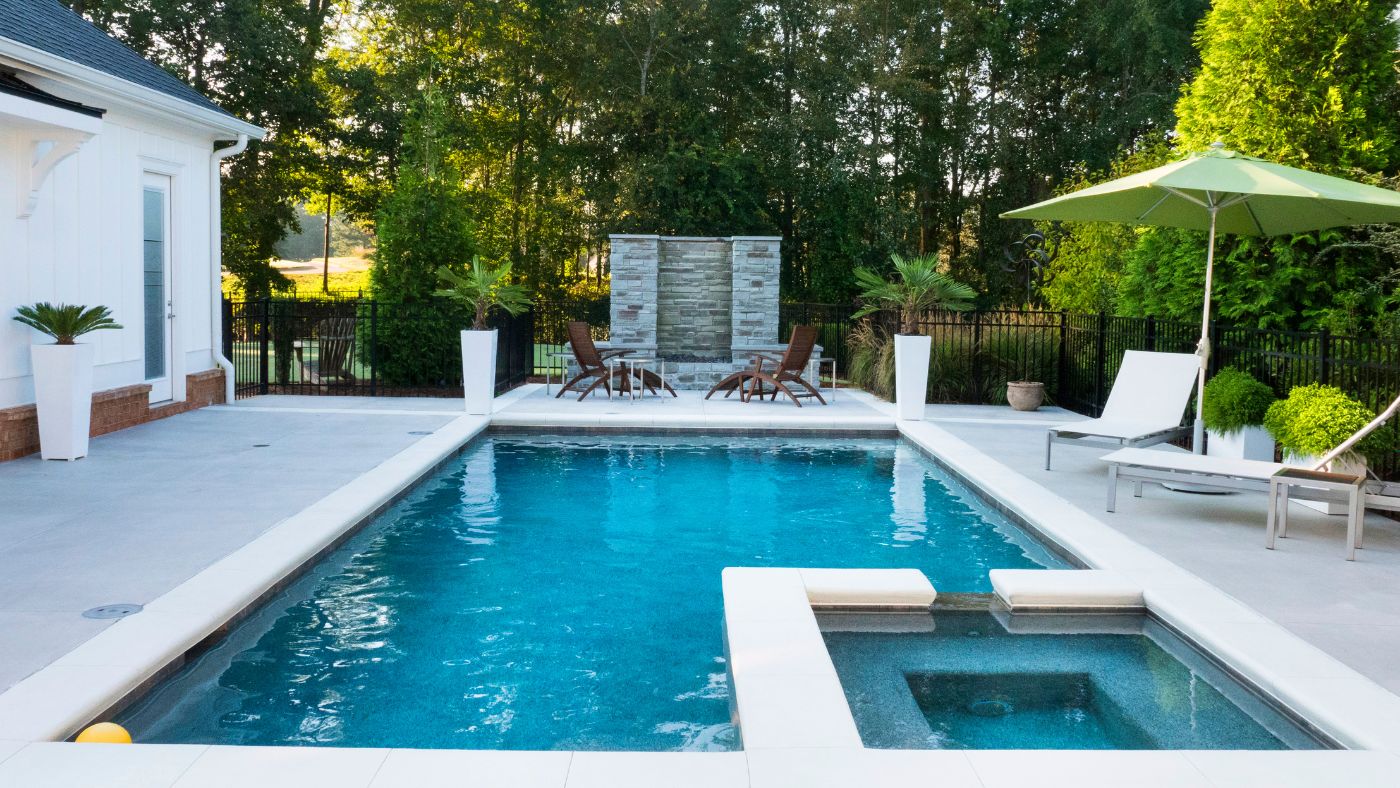
Understanding Saltwater Pools
Saltwater pools have gained popularity in recent years for their gentler feel and reduced need for traditional chemicals. Unlike traditional pools, where chlorine is added manually, saltwater pools generate their own chlorine through a salt chlorine generator. This process requires a different approach to maintenance, but the benefits often outweigh the extra care required.
What is a Saltwater Pool?
A saltwater pool isn’t chlorine-free; instead, it uses a salt chlorine generator to convert dissolved salt into chlorine through electrolysis. This system continuously produces enough chlorine to keep the pool water sanitized without the need for manually adding chemicals. As a result, swimmers enjoy water that’s less harsh on their skin and eyes compared to traditional chlorine pools.
Visually, you likely won’t notice any difference between a saltwater pool and a traditional chlorine pool. The water in both looks the same—clear and clean—if properly maintained. However, many swimmers report that saltwater pools feel different. The water in a saltwater pool tends to be softer and less irritating, especially for sensitive skin or eyes. Additionally, saltwater pools don’t carry the strong chlorine smell that traditional pools often have.
Saltwater pools are praised for their lower reliance on chemical products, easier maintenance routines, and overall gentler feel. While the upfront cost of installing a saltwater system may be higher, the long-term savings in maintenance and chemical expenses make it a cost-effective solution.
How Saltwater Pools Work
Saltwater pools function through a process called electrolysis, in which a salt chlorine generator splits salt (sodium chloride) into sodium and chlorine. The chlorine acts as a sanitizer, keeping the water clean and safe for swimming. This continuous production of chlorine helps maintain the pool with less need for manual chemical adjustments compared to traditional chlorine pools.
It's important to regularly test and monitor salt levels in your pool to ensure proper salinity. High salt levels can lead to corrosion and ineffective sanitization, while low levels can reduce the efficiency of the chlorine generator. Regular maintenance, including frequent testing and adjustments based on conditions like rainfall and heavy pool usage, is essential to keep the pool water safe and clear.
To keep this system running smoothly, you need to monitor both the generator and the pool’s water chemistry. A well-balanced pool will keep the generator working efficiently and prevent issues like scale buildup, cloudy water, or algae growth.
Saltwater Pool Maintenance Basics
Maintaining a saltwater pool is relatively simple once you understand the core components. Regular attention to your pool’s water chemistry and circulation ensures the system works effectively and keeps your pool water clean and inviting. By focusing on these key areas, you’ll prevent most common issues and prolong the life of your equipment.
Testing and Balancing Water Chemistry
Regularly testing and balancing your pool’s water chemistry is key to ensuring the pool remains sanitized and safe for use. The key elements you need to monitor are:
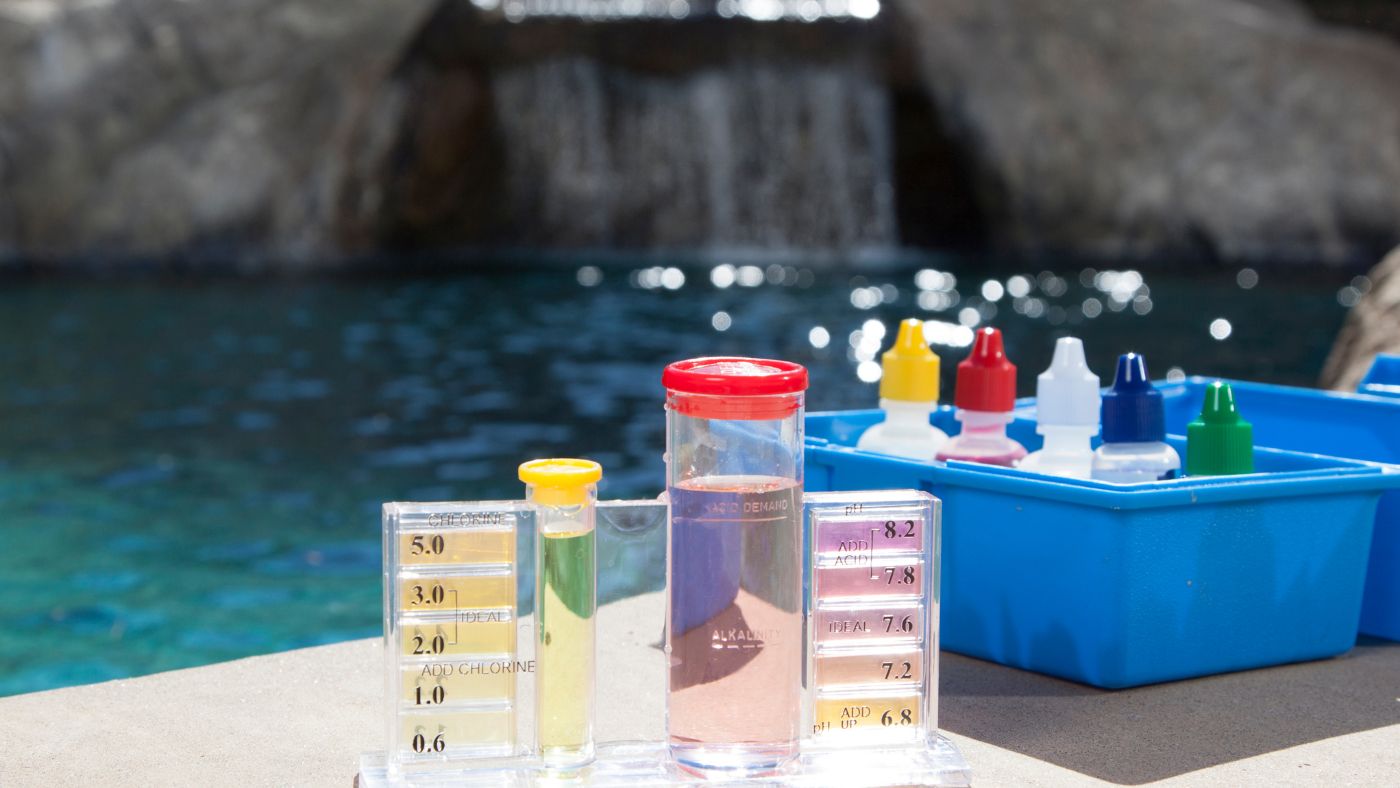
- Chlorine Levels: Test the free chlorine levels weekly to ensure they are within the recommended range of 1-3 ppm. If levels drop below this range, adjust the salt chlorine generator to increase production and maintain sanitization.
- pH Levels: Aim to keep the pool’s pH between 7.2 and 7.6. A balanced pH is vital for preventing scaling on pool surfaces and equipment, as well as ensuring that the chlorine remains effective. If the pH is too high, you can lower it using muriatic acid; if it’s too low, add a granular pH increaser to raise it. You can also limit pH fluctuations with PEPPER®, but more on that a little later.
- Cyanuric Acid Levels: Monitoring cyanuric acid (CYA) levels is crucial for maintaining chlorine levels and preventing chlorine degradation from UV rays. Ideally, CYA levels should be between 30 and 50 PPM. Regular testing and maintenance are essential for optimal performance in both saltwater and traditional chlorine-based pools.
Regularly balancing your water chemistry helps protect both the pool’s surfaces and the equipment from damage, keeping your pool water comfortable for swimmers.
Testing Free Chlorine Levels Every Week
Testing free chlorine levels every week ensures the water in your saltwater pool is properly sanitized. Free chlorine is the active form of chlorine that kills bacteria, viruses, and other microorganisms that can contaminate the water. To test free chlorine levels, you can use a liquid test kit or test strips. The ideal free chlorine level for a saltwater pool is between 1-3 parts per million (ppm). If the level is too low, you may need to adjust the salt chlorine generator to produce more chlorine. On the other hand, if the level is too high, you may need to reduce the chlorine output to prevent over-chlorination.
Balancing pH Levels Weekly
Balancing pH levels weekly helps maintain the overall health and safety of your saltwater pool. The ideal pH range for a saltwater pool is between 7.2 and 7.6. If the pH level is too high or too low, it can cause eye and skin irritation, as well as damage to your pool equipment. It’s also important to test the total alkalinity (TA) level, which should be between 80-120 ppm, to ensure the pH level remains stable.
Maintaining Proper Water Circulation
Proper water circulation ensures your pool water stays clean and evenly sanitized. Running the pump and filter for at least 8 hours per day effectively distributes chlorine throughout the pool, reducing the risk of algae and bacteria buildup.
In addition to improving sanitization, good circulation helps remove debris and keeps the water clear. Check your pool’s pump and filter regularly to make sure they’re working efficiently, and clean or replace filters as needed to maintain optimal performance.
Importance of Proper Water Circulation
Proper water circulation is vital to maintain the health and safety of your saltwater pool. Good circulation helps to distribute the salt and chlorine evenly throughout the pool, preventing the buildup of dirt and debris. It also helps to prevent the growth of algae and bacteria, which can contaminate the water. To ensure proper water circulation, remember that you should run the pump and filter for at least 8 hours a day, and adjust the return jets to ensure the water is circulating evenly.
Preventing Calcium Buildup and Erosion
One common issue with saltwater pools is calcium buildup, especially on the salt cell, which can reduce the efficiency of the chlorine generator. To prevent this, inspect the salt cell every few months and clean it according to the equipment manufacturer’s recommendations to remove any deposits.
Corrosion is another potential concern, particularly around metal components and the pool’s surroundings, which may be exposed to salt water. Regularly rinsing the pool area with fresh water can help prevent damage to these surfaces. Be mindful of salt residue, especially on pool decks, railings, and metal tracks, to avoid long-term corrosion.
Enhancing Your Pool’s Performance with PEPPER®
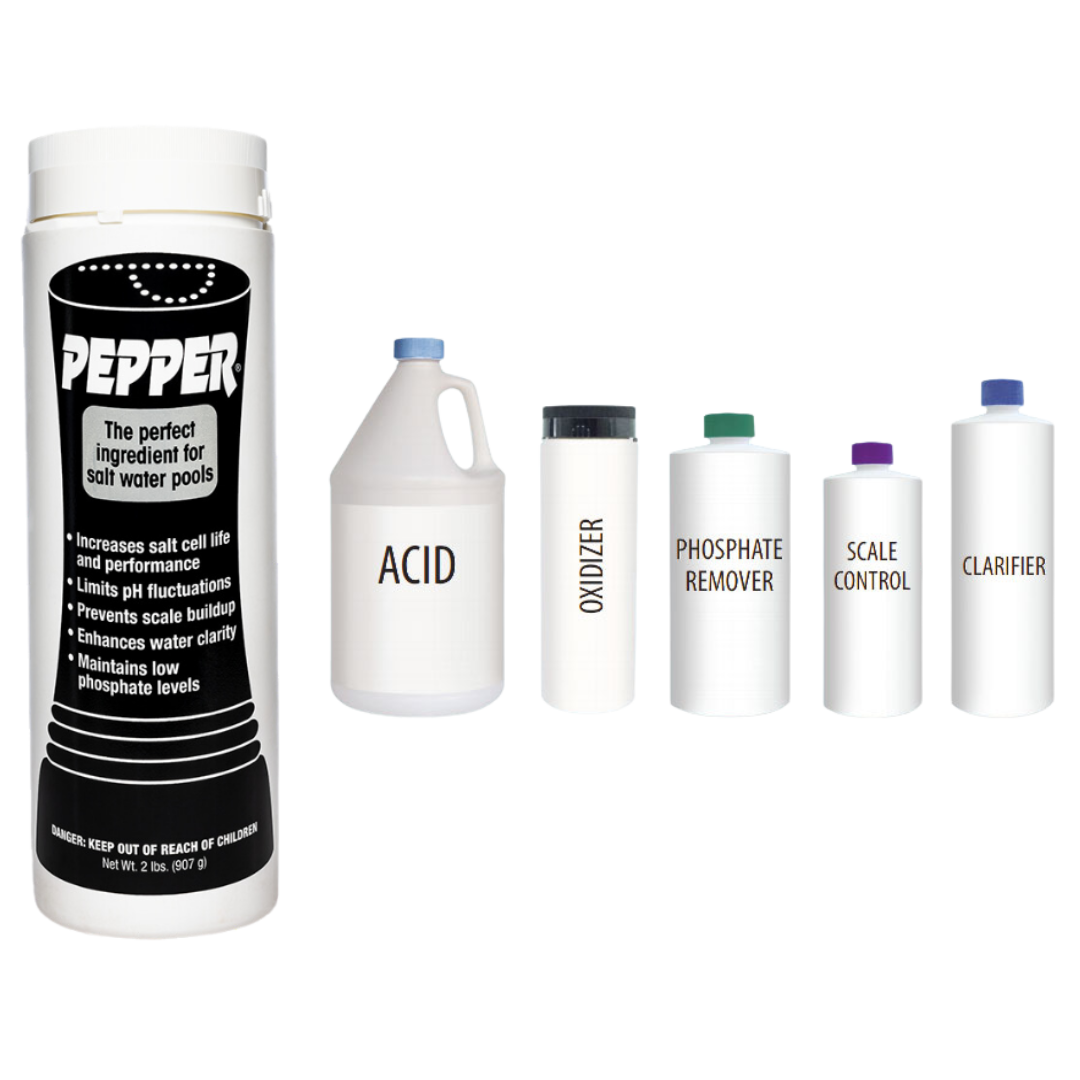
While basic saltwater pool maintenance covers most essential tasks, addingPEPPER® to your routine can simplify your upkeep and improve the overall performance of your pool. PEPPER®is designed specifically for saltwater pools, helping to:
- Extend the life of your salt chlorine generator by preventing scale buildup on the cell.
- Improve chlorine efficiency, ensuring better sanitization with less adjustment.
- Enhance water clarity by oxidizing debris and improving filter performance.
- Stabilize pH levels, reducing fluctuations and preventing common chemical imbalances.
- Prevent calcium and phosphate buildup, limiting the formation of scale and reducing maintenance efforts.
UsingPEPPER® regularly will not only help you maintain your pool’s cleanliness but also reduce the frequency of chemical adjustments and deep cleanings, making your pool care routine easier and more efficient.
Routine Saltwater Pool Care Tasks
To keep your salt water pools functioning at their best, routine care is essential.
Regular cleaning, including skimming, brushing, and vacuuming, ensures the water stays free from debris and your pool’s surfaces remain in excellent condition. Consistent cleaning also helps prevent algae growth and extends the life of your pool equipment.
Cleaning the Pool: Skimming, Brushing, and Vacuuming
Regular cleaning is crucial for any pool, including saltwater systems. To keep your pool pristine:
- Skim the pool: Remove debris like leaves and bugs from the surface daily using a skimmer net.
- Brush the walls and floor: At least once a week, brush the pool walls and floor to prevent algae and dirt buildup.
- Vacuum the pool: Use a pool vacuum to remove dirt and debris that has settled on the bottom of the pool.
- Clean skimmer and pump baskets: Check and empty the skimmer and pump baskets regularly to ensure optimal water flow and filtration. This helps prevent clogs and keeps your pool’s circulation system functioning efficiently.
PEPPER® assists in reducing the need for frequent brushing and vacuuming by improving filtration and reducing phosphate levels, which limits algae growth.
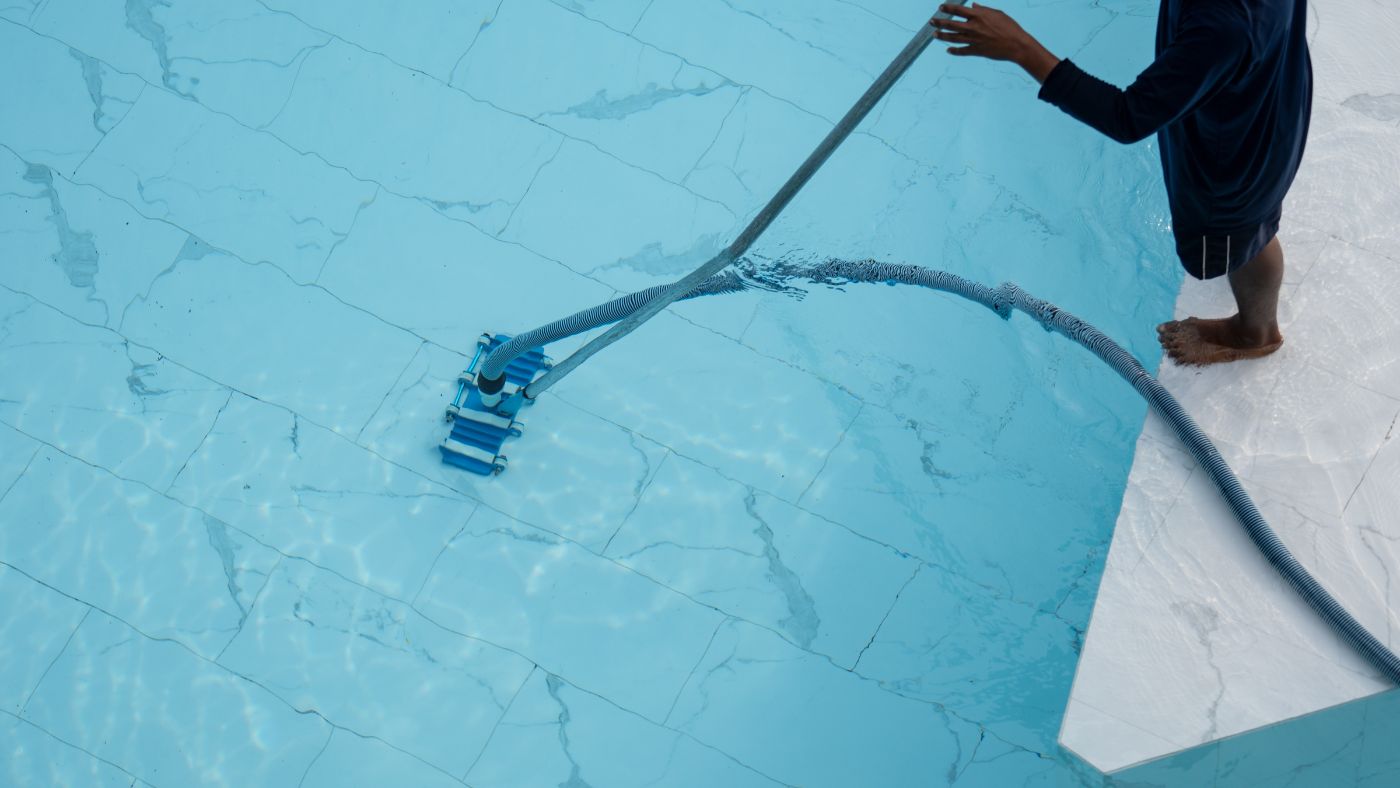
Shocking the Pool
Even with proper maintenance, it’s important to shock your pool once a week to kill bacteria and prevent algae growth. Shocking involves adding a large dose of chlorine or a non-chlorine shock to the pool, which helps sanitize and clear the water. PEPPER® is a strong weekly shock specifically designed for saltwater pools, improving chlorine efficiency and enhancing water clarity.
For more in-depth information about chlorine and non-chlorine shocks and how they word, check out our article about chlorine shock vs non-chlorine shock.
Remember, of course, always to follow the instructions on your chosen shock product for best results.
Salt Cell Maintenance
The salt cell is the core component of a saltwater pool, converting salt into chlorine. Over time, calcium deposits can form on the cell plates, reducing its efficiency. To maintain optimal performance:
- Inspect the salt cell every 3 months: Look for signs of scale buildup.
- Clean the salt cell: Use a hose to rinse the plates or clean per your equipment manufacturer’s recommendations if necessary, if necessary.
Regular cleaning will extend the life of the salt cell and keep your chlorine generator running smoothly. By preventing scale buildup, PEPPER® also helps maintain the efficiency of your chlorine generator, reducing the frequency of necessary cleanings.
Troubleshooting Common Saltwater Pool Issues
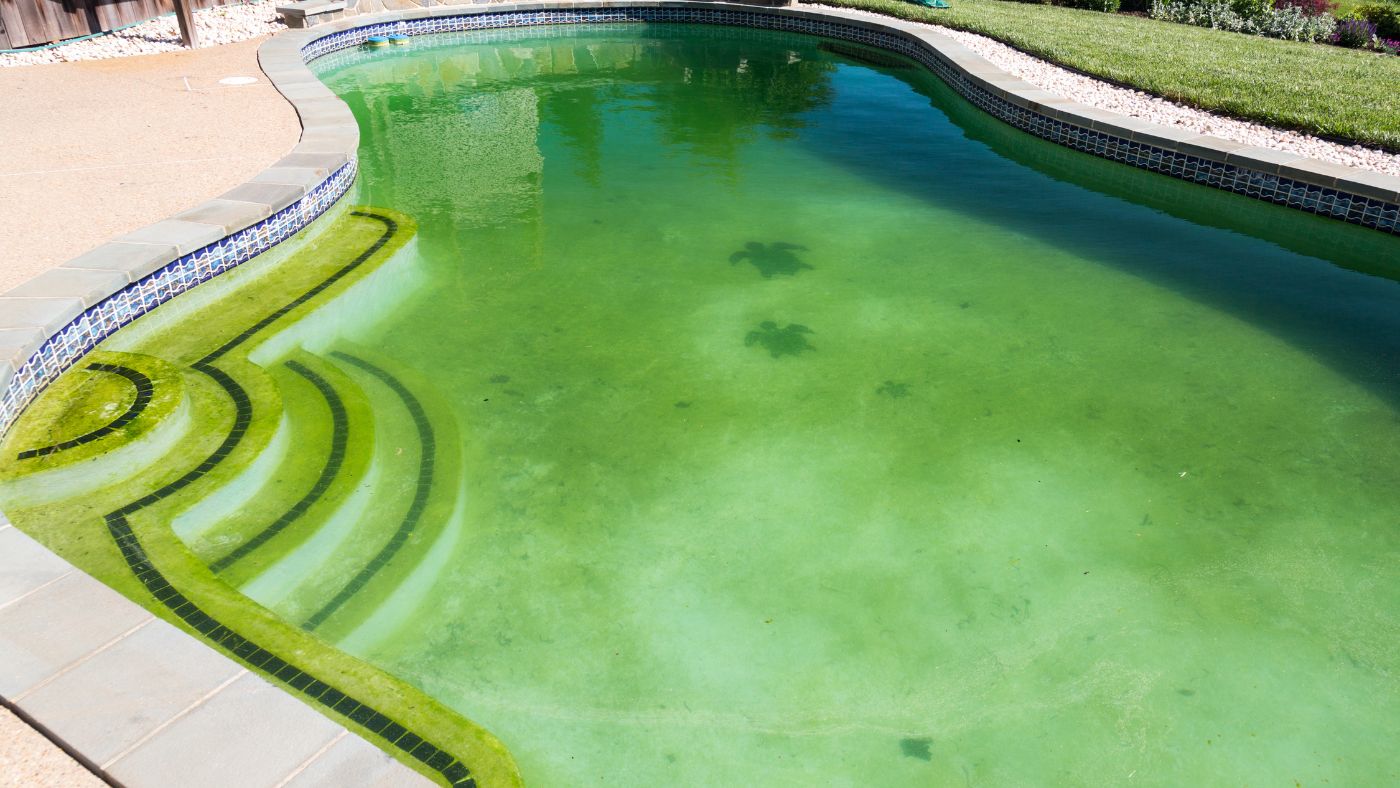
Even with diligent maintenance, a saltwater swimming pool can sometimes experience common issues, such as cloudy water or algae growth. These problems can typically be traced back to imbalanced water chemistry or improper filtration, but they’re usually easy to resolve with the right approach.
Before these issues become larger problems, it’s important to understand how to identify and troubleshoot them effectively.
Cloudy Water
Cloudy water is often caused by imbalanced pH or chlorine levels, poor filtration, or an excess of calcium. Regularly testing your water and ensuring proper circulation will help avoid this issue.
- Solution: If the water is cloudy, test the water chemistry and adjust as needed. Check the filter for debris and clean it out to improve water flow.
- Prevention: Use PEPPER® to maintain pH and chemical levels, as well to enhance water clarity.
Algae Growth
Algae can become a problem in saltwater pools, particularly during hot weather or if the pool isn’t cleaned regularly. To prevent algae:
- Maintain proper chlorine levels: Test your pool weekly and ensure the chlorine stays within the proper range.
- Brush and vacuum regularly: This helps to remove algae spores before they have a chance to bloom.
- PEPPER®: By maintaining low phosphate levels, PEPPER® limits the food source for algae, reducing the chance of growth.
Converting a Chlorine Pool to Saltwater
If you’re considering converting your traditional chlorine pool to a saltwater system, the benefits include lower maintenance, softer water, and fewer harsh chemicals. The process involves installing a salt chlorine generator and adding the appropriate amount of salt to the water.
While the initial investment in a saltwater generator may be higher, the ongoing costs are typically lower because you’ll need to buy fewer chemicals, and the system requires less day-to-day maintenance.
Benefits of Converting to a Saltwater Pool
Converting to a saltwater pool can have several benefits, including reduced chlorine usage, lower chemical costs, and softer water that feels better on the skin and eyes.
Saltwater pools are also less likely to cause skin and eye irritation, making them a great option for families with children or people with sensitive skin. Additionally, saltwater pools require less maintenance compared to traditional chlorine pools, as they don’t need to be shocked as frequently.
Simplifying Saltwater Pool Maintenance
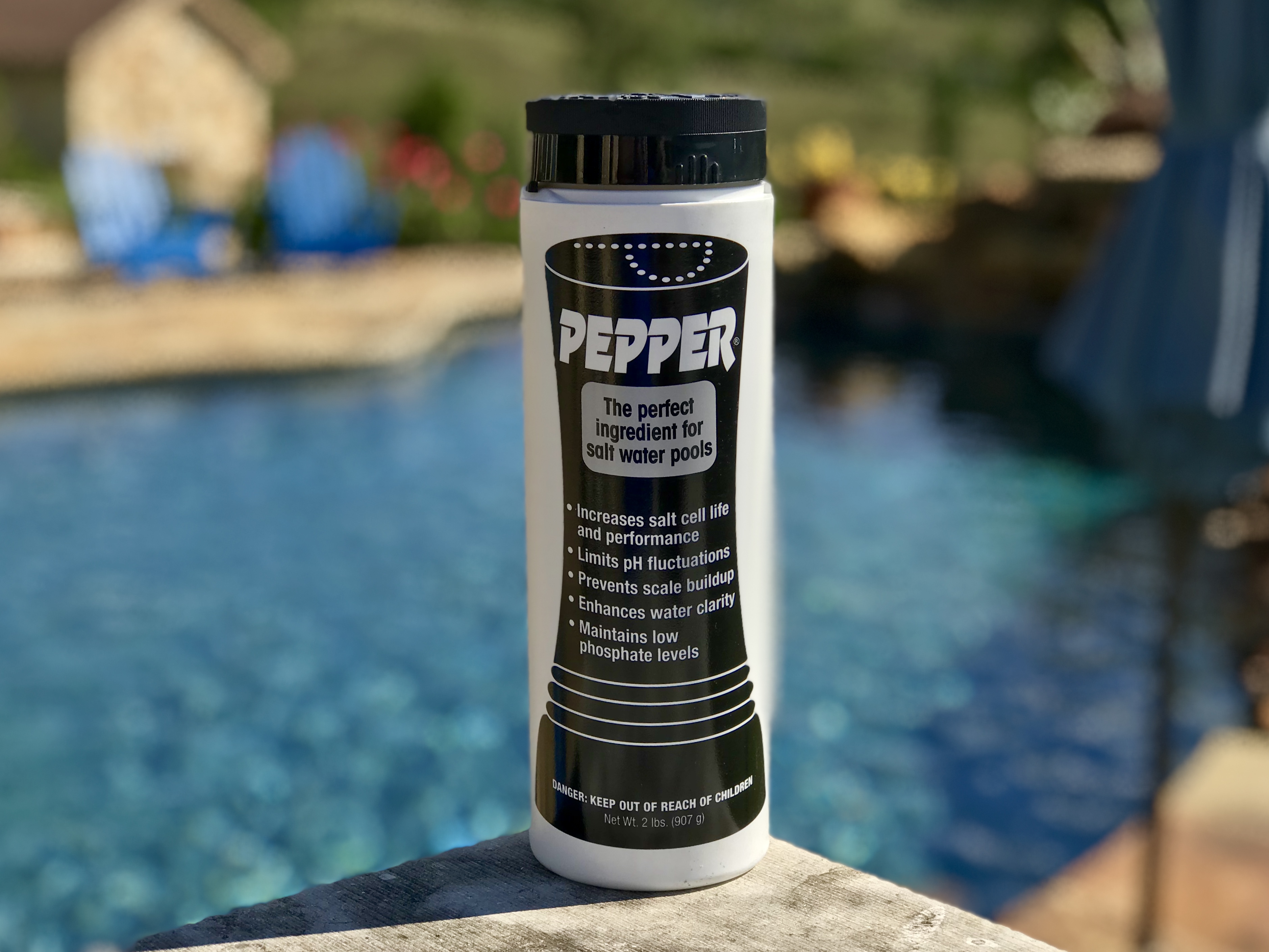
Maintaining a saltwater pool is simple and rewarding when you focus on the essentials: regular water testing, proper equipment care, and consistent cleaning. By incorporating PEPPER® into your routine, you can enhance water clarity, protect your pool equipment, and reduce the need for frequent chemical adjustments.
With the right tools and a solid maintenance plan, your saltwater pool will remain clean, safe, and enjoyable for years to come—providing you with a low-maintenance, high-enjoyment swimming experience.
